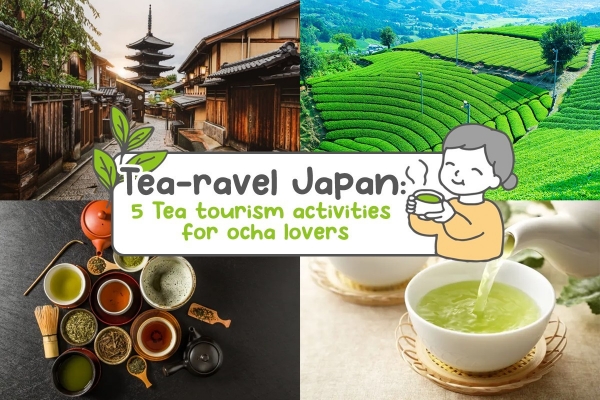Tea-ravel Japan: 5 Tea tourism activities for ocha lovers

Matcha (抹茶), sencha (煎茶), hōjicha (焙じ茶), genmaicha (玄米茶)...visit any Japanese-style establishment in your area and you will most certainly be served with a piping-hot cup of tea before anything else. For hundreds of years, Japan has been honing and perfecting the art of omotenashi, or wholehearted hospitality, and the act of serving tea has stood at the core of this practice ever since the development of the tea ceremony in the Muromachi Period (1338-1573).
If you travel to any Japanese city with a focus on historic preservation such as Kyoto (京都市 Kyōto-shi) or Kanazawa City (金沢市 Kanazawa-shi), you can easily find entire streets lined with teahouses where tourists can participate in an authentic tea ceremony experience. If you want to go straight to the source, and get a firsthand look at how your favourite teas are grown and harvested, many tea plantations offer unique packages for tourists to experience and sample their stock. Here in this article, I am going to list out 5 different places and ways you can include tea tourism into your next itinerary!
1. Tea Museum, Shizuoka

(Image credit: Asturio Cantabrio / CC BY-SA 4.0)
Shizuoka Prefecture (静岡県 Shizuoka-ken), also known as the Capital of Tea, is the reigning king of tea leaves amongst all the prefectures of Japan. As one of Japan’s largest tea-producing areas, Shizuoka has a cha-rming reputation for all things related to green tea—from vast tea plantations to historical tea houses. As part of a recent prefectural effort to enhance, and spread the appeal of Shizuoka’s tea to the world, a new museum has been opened in the area as one of the places to get the most comprehensive coverage of tea culture in the country.
Opened in 2018, the Fuji no Kuni Tea Museum, Shizuoka (ふじのくに茶の都ミュージアム) is a place to see, touch, and taste the charms of tea from Japan and around the world. Located on the Makinohara Plateau (牧之原台地 Makinohara daichi), the largest tea farming plantation in Japan, this museum features regular and special exhibitions, as well as a tea ceremony house, Japanese garden, and commercial facilities. On clear days, you will also get stunning views of Mount Fuji from the garden!
Fuji no Kuni Tea Museum, Shizuoka (ふじのくに茶の都ミュージアム)
Address: 3053-2 Kanayafujimi-cho, Shimada-shi, Shizuoka 428-0034
Nearest station: JR Kanaya Station (金谷駅)
Access: 5 minutes by bus from the station
Opening hours (Museum): 9am–4:30pm (Last entry at 4pm)
Opening hours (Tea Room): 9:30am–4pm (Last entry at 3:30pm)
Admission fee: ¥300
Tel: +81 547-46-5588
2. Teahouse in Sumpu Castle Park Momijiyama-goen, Shizuoka

Even from an angle where you can't view Mount Fuji, you might catch a glimpse of the garden’s very own mini Mount Fuji. (Image credit: Soramimi / CC BY-SA 4.0)
A short 10-minute walk from Shizuoka Station (静岡駅 Shizuoka-eki) lies Sumpu Castle Park (駿府城公園 Sumpujō-gōen), site of the former Sumpu Castle (駿府城 Sumpujō), a significant locale in the life of Tokugawa Ieyasu (徳川家康). While most of the castle buildings present there today is a reconstruction, nestled within the castle grounds is Momojiyama Garden (紅葉山庭園 Momijiyama-goen), a beautiful four-zone landscape garden featuring the seasonal beauty of Suruga (駿河).
A relaxing spot to spend some time in the garden would be the teahouse, where you can take in the historic ambience and get a good view of Sumpu Castle's facade. Aside from being able to enjoy a spot of tea and sweets for ¥520 in one of the many tea rooms, you may also be able to experience the historic game of Tocha (闘茶 Tōcha, literally "Battle Tea"), where you have to guess the names of different types of tea served to you in a blind taste test!
Sumpu Castle Park (駿府城公園)
Address: 1-1 Sumpujyokouen, Aoi-ku ,Shizuoka City 420-0855
Nearest station: JR Shizuoka Station (静岡駅)
Access: 10-minute walk from the station
Opening hours: 9:30 am–4:30 pm (Last entry: 4pm)
Admission fee: ¥150 (Adults), ¥50 (Children)
Tel: +81 54-251-0016
*For more information on each teahouse, please refer to the website.
3. Tea Cycling at Ureshino, Saga

(Image credit: Tea Tourism)
In the far west of the country, nestled in Saga Prefecture (佐賀県 Saga-ken), lies a bounty of specialty Japanese Tea in the hills of Ureshino City (嬉野市 Ureshino-shi). Aptly named Ureshino-cha (嬉野茶), this brand of tea is famous for its high quality despite comprising an incredibly small percentage of Japan’s green tea production. If you visit the area in the October to November period, you will be able to rent tea bottles and enjoy a leisurely cycle around the tea plantations and enjoy the flowers in bloom right as they are harvested for fresh tea.
Shimomura Cycles (シモムラサイクルズ)
Address: 938-1 Otsu, Ureshinomachi Oaza Shimojuku, Ureshino-shi, Saga 843-0301
Nearest station: Takeo Onsen Station (武雄温泉駅)
Access: 30-minute bus ride bound for Ureshino from the station, followed by a 3-minute walk to the bicycle shop.
Opening hours: 11am–6pm (Closed on Wednesdays)
Admission fee (For bicycle rental): ¥800
Tel: +81 954-27-7733
4. Japan's oldest tea shop & Byodoin Omotesando at Uji, Kyoto

This unassuming shop is a testament to the enduring legacy of Japan’s tea culture. (Image credit: Miya.m / CC BY-SA 4.0)
There’s no way we can make a list of green tea locales without including a spot in Kyoto, the spiritual birthplace of Japan’s tea culture! The town of Uji (宇治市 Uji-shi) in particular is famous for bringing matcha to the world, the ever-popular darling of tea flavours. Of the myriad tea houses and shops in Uji where you can partake in Tea ceremonies and matcha-centric cuisines, I highly recommend Tsuen Tea (通圓), the oldest teahouse in the world. Located just across from Uji Station (宇治駅 Uji-eki), this family-run teahouse has existed for 24 generations and sells a wide variety of tea products—perfect for a souvenir to gift back home.

Rustic shopping streets like these are common in the old town parts of Japan. (Image credit: お茶の京都)
Across the Uji Bridge (宇治橋 Uji-bashi), there is also a row of tea stores leading up to Byodoin Temple (平等院 Byōdōin) that are also worth a visit. Everything including matcha desserts, paraphernalia, and even a certain old-fashioned Starbucks can be found in the Byodoin Omotesando (平等院表参道), a veritable dream-come-true for any diehard matcha fan.
Tsuen Teahouse (通圓茶屋)
Address: 1 Higashiuchi, Uji, Uji-shi, Kyoto 611-0021
Nearest station: Uji Station (宇治駅)
Access: 2-minute walk from the station
Opening hours: 9:30am–5:30pm
Tel: +81 774-21-2243
5. Tea leaf-picking at Sayama, Saitama

The tea garden offers a refreshing escape from the daily hassles of life. (Image credit: photoAC)
If you want to experience a tea plantation tour that’s even closer to Tokyo than Shizuoka, look no further than Sayama City (狭山市 Sayama-shi), in Saitama Prefecture (埼玉県 Saitama-ken). A city proud of the flavour of its green tea, there are various programs available for tourists to get on the field and learn about green tea the Sayama Way. One place I would recommend to try out is Miyanoen (宮野園), a tea specialty store that also offers several tea enrichment programmes. Besides courses on brewing, tasting, and conducting tea ceremonies, one of their highlights is the Tea Leaf Picking course which runs from May to November, where you get to don the colourful traditional outfits of the chamusume (茶娘 tea girls) and learn to sing harvest songs.
Miyanoen (宮野園)
Address: 25-2 Kitairiso, Sayama-shi, Saitama 350-1315
Nearest station: Iriso Station (入曽駅)
Access: 30-minute walk from the station
Opening hours: 10am–6pm
Admission fee: ¥1,000,
Admission fee (For rental of costume): ¥500
Tel: +81 4-2959-3025

(Image credit: photoAC)
Both when it was first brought to Japan and now, tea is something that can be enjoyed by people of all walks of life, and exists in the modern-day as an essential part of the Japan travel experience. Indulge yourself on your next trip with a little bit of tea tourism, and receive a newfound appreciation for this unassuming beverage the next time you take a sip!


This article is sponsored by Japan National Tourism Organization (JNTO) Singapore Office.
Header image credit: photoAC





